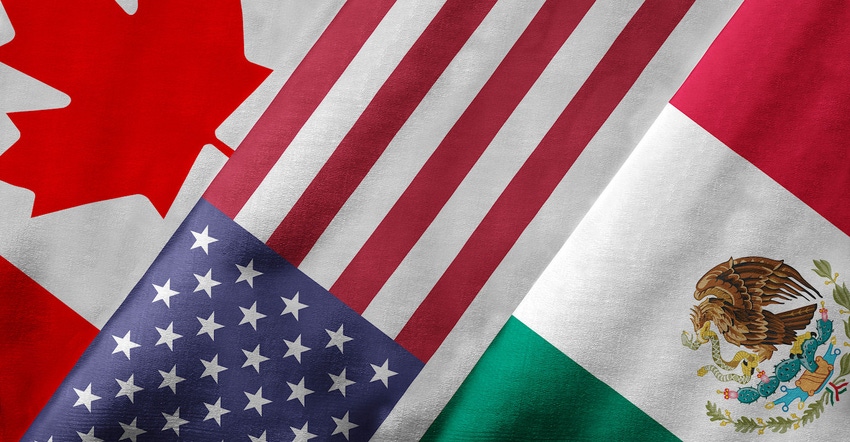Resolving ongoing trade dispute important to positive bilateral relations between the United States and Mexico

The Mexican Supreme Court ruled April 28 by a unanimous vote of 5 to 0 in favor of overturning a 2017 lower court decision that prevented the Mexican federal government from implementing regulations to allow for the importation of fresh U.S. potatoes throughout the country. The ruling, cheered by the National Potato Council and Potatoes USA, marks the end of a decade-long legal process that began when Mexico’s potato industry sued its government to prevent competition from imports.
Secretary of Agriculture Tom Vilsack notes the unanimous ruling puts U.S. fresh potatoes one step closer to finally gaining access to Mexico following nearly 20 years of negotiations. This decision is important for American agriculture and for positive bilateral relations between the United States and Mexico. USDA has worked for years on a resolution to this ongoing issue.
“It was something I prioritized as Secretary between 2009-2016 and one of the first issues I discussed with Mexico’s Secretary of Agriculture when I returned this year,” says Vilsack. “U.S. industry representatives estimate that implementation of full market access for U.S. potatoes could increase U.S. exports from approximately $50 million in 2020 to $150 million or more. We look forward to resuming bilateral technical engagements to finalize import requirements as soon as possible.”
“This ruling is consistent with Mexico’s obligations under the USMCA and the WTO. It represents a major step forward in the U.S. potato industry’s efforts to provide consumers throughout Mexico access to fresh, healthy U.S.-grown potatoes,” says Jared Balcom, vice president of trade affairs for the National Potato Council (NPC) and potato grower from Pasco, Wash. “After decades of delay, we hope this ruling represents a light at the end of the tunnel and that Mexican regulators will immediately begin working on regulations to allow for the importation of fresh U.S. potatoes throughout their country.”
“Mexican consumers and the chip manufacturers in Mexico have waited way too long to access fresh U.S. potatoes,” states Jaren Raybould, chair of Potatoes USA and a potato grower in Saint Anthony, Idaho. “We are hopeful that with this ruling the authorities will quickly reimplement the market access agreement and allow for high quality U.S. potatoes to be enjoyed throughout Mexico.”
Since it first allowed for the importation of fresh U.S. potatoes in 2003, Mexico has restricted those potatoes to a 26 kilometer-area along the U.S.-Mexico border. That restriction has violated Mexico’s obligations under numerous trade agreements, including NAFTA, WTO, and now the U.S.-Mexico-Canada Agreement (USMCA). The Mexican government finally agreed to allow U.S. potatoes full access to their market beginning in May 2014; however, immediately after that was implemented, the National Confederation of Potato Growers of Mexico sued its government, claiming Mexican regulators have no authority to determine if agricultural imports can enter the country.
The Supreme Court decision rejected CONPAPA's arguments and affirms that the Mexican government does indeed have the authority to issue regulations about the importation of agricultural and food products, including fresh U.S. potatoes.
“Mexico offers a significant opportunity for U.S. potato growers,” states John Toaspern, chief marketing officer at Potatoes USA. “The trade in fruits and vegetables between the U.S. and Mexico is hugely beneficial to growers and consumers in both countries. In fact, Mexican avocados were granted access to the U.S. at the same time as U.S. potatoes to Mexico in 2003. Since that time, the U.S. government has honored the agreement and imports of Mexican avocados are now over $2 billion. The U.S. can supply a wide variety of fresh high-quality potatoes to Mexico, russets, reds, yellows, whites, fingerlings and chipping potatoes year-round that are not currently produced there. Mexican retailers, foodservice operators, food manufactures and ultimately Mexican consumers will benefit from this wide array of high-quality potatoes available year-round.”
Mexico is the third largest export market for U.S. potatoes and products valued at over $270 million in 2020. Despite the restriction to the 26-kilometer border region Mexico is the second largest market for fresh potato exports accounting for 106,000 metric tons valued at $60 million in 2020. The U.S. potato industry estimates that access to the entire country for fresh U.S. potatoes will provide a market potential of $200 million per year, in five years.
“This is a significant step that effectively ends the legal process that has blocked our access to the Mexican market,” adds NPC CEO Kam Quarles. “This effort has spanned numerous administrations and sessions of Congress, but the U.S. position never wavered. We are thankful for everyone at USDA, the Office of the U.S. Trade Representative, and Members of Congress who have worked for years to encourage Mexico to lift these protectionist restrictions. We now look forward to working with the Mexican government and its regulatory agencies in immediately reinstating the rules to allow for fresh U.S. potatoes to be shipped and the normalization of trade between our countries.”
Continued trade efforts
Vilsack adds, “With more certainty returning to U.S. trade relationships in 2021, U.S. agricultural exports continue to perform strongly and remain poised to continue at a robust pace. Decisions like this one today are important for long-term export growth.”
U.S. Senator Mike Crapo, R-Idaho, says, the decision by the Mexican Supreme Court is a positive step forward. “I will not, however, consider the matter finished until Idaho’s farmers are able to sell high-quality potatoes to every family in Mexico -- as is their right under the United States-Mexico-Canada Agreement,” he says. “Moreover, I remain concerned that Mexico is maintaining or enacting new restrictions on other U.S. agricultural products that lack any scientific justification. I will continue to work with USTR to ensure that Mexico upholds its commitments under the USMCA.”
About the Author(s)
You May Also Like





